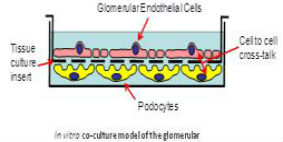Glomerular cell biology
Glomerular cell biology is a core strength of the Bristol Renal group. We have an international reputation and numerous collaborations based on our unique conditionally immortalized cell lines. Our human cells in particular are widely recognised as the gold standard model of these cells for in vitro studies.
Glomerular capillaries have unique adaptations allowing their walls to function as a biological sieve known as the glomerular filtration barrier. This enables the kidneys to fulfil their primary role of filtering the blood to remove water and small waste products whilst retaining proteins and blood cells in the circulation. Filtration is dependent on the unique structure of the capillary wall comprising layers of two key cells types, glomerular endothelial cells (GEnC) and podocytes, separated by a specialised basement membrane.
We are particularly interested in diseases which cause a breakdown in the glomerular filtration barrier causing proteinuria and eventually kidney failure. These conditions include diabetic nephropathy, membranous nephropathy and FSGS. We therefore use our GEnC and podocyte cell lines to understand how they contribute to the filtration barrier in health, how their function is disturbed in disease and how damage in disease can be prevented or reversed with medical treatments.
Our in vitro work is complemented by corresponding in vivo work using disease models and transgenic mice. These approaches allow us to further dissect the importance of glomerular cells, and specific individual genes, as well as testing novel therapeutic approaches. A recent clinical trial as defined the roles of particular therapies in treatment of membranous nephropathy, a podocyte disease.
In addition to particular proteinuric renal diseases our work focuses in particular in the endothelial glycocalyx, regulation of the podocyte foot processes, podocyte insulin signalling and cell-cell communication including via members of the VEGF family of proteins.
